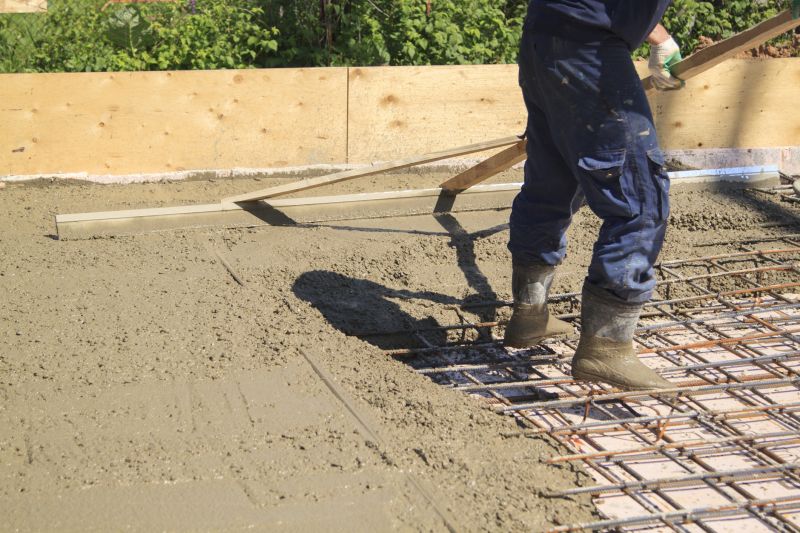Essential Products For Efficient Concrete Installations
Identify the must-have tools and materials that boost productivity and ensure precision in your concrete building tasks.
 Concrete installations are fundamental to a variety of construction and renovation projects, offering durability and stability for surfaces such as driveways, walkways, patios, and foundations. Selecting the right products for concrete work is essential to ensure longevity, safety, and a professional finish. From mixing and curing supplies to reinforcement materials and finishing tools, the market offers a wide array of options tailored to different project sizes and complexities.
Concrete installations are fundamental to a variety of construction and renovation projects, offering durability and stability for surfaces such as driveways, walkways, patios, and foundations. Selecting the right products for concrete work is essential to ensure longevity, safety, and a professional finish. From mixing and curing supplies to reinforcement materials and finishing tools, the market offers a wide array of options tailored to different project sizes and complexities.
Top Overall Option
Concrete Mix and Curing Set
A comprehensive concrete mix and curing set provides all essential components for a successful installation, including high-quality concrete, curing compounds, and additives. This versatile kit is suitable for various projects, offering reliable performance and ease of use for both DIY enthusiasts and professionals.
Types of Products For Concrete Installations
Concrete Mix
Pre-blended concrete mixes suitable for different applications, available in various strengths and formulations.
Reinforcing Steel
Rebar and wire mesh options to strengthen concrete structures and prevent cracking.
Form Liners
Molds and panels used to shape and contour concrete surfaces for decorative or functional purposes.
Expansion Joints
Materials that accommodate movement and prevent cracking in large concrete slabs.
Concrete Sealers
Protective coatings that enhance durability and resist stains or weathering.
Finishing Tools
Tools such as trowels, floats, and edgers used to achieve smooth and professional surface finishes.
Concrete Pumps
Equipment for efficiently transporting and placing concrete in hard-to-reach areas.
Vibrators
Tools that help remove air bubbles and ensure proper compaction of concrete.
Curing Compounds
Products that retain moisture in the concrete to promote proper curing and strength development.
Surface Retarders
Chemicals that delay surface setting to create textured or decorative finishes.
Concrete Stamps
Molds used to imprint patterns and textures onto freshly poured concrete for decorative effects.
Form Release Agents
Substances that facilitate the removal of forms without damaging the concrete surface.
Anchors and Fasteners
Hardware for securing fixtures or structural elements to concrete surfaces.
Admixtures
Additives that modify concrete properties, such as setting time, workability, or durability.
Concrete Cutting Tools
Saw blades and drills designed for precise cutting and drilling into hardened concrete.
Popular Choices
Widely used for various projects, offering versatility and ease of use.
Common reinforcement material for structural integrity.
Popular for reinforcing slabs and foundation work.
Reusable molds for shaping concrete surfaces.
Frequently chosen to protect and enhance finished surfaces.
Essential tools for finishing concrete surfaces.
Commonly used to ensure proper compaction.
Important for large slabs to accommodate movement.
Popular for maintaining moisture during curing.
Efficient for larger projects requiring quick placement.
Chosen for decorative finishing techniques.
Trend for decorative concrete surfaces.
Commonly used to facilitate form removal.
Popular for securing fixtures to concrete.
Selected for customizing concrete properties.
Proper preparation and the right accessories can significantly influence the outcome of a concrete installation. High-quality concrete mixes provide a reliable base, while additives can enhance workability or curing times. Reinforcement products like rebar and wire mesh contribute to structural integrity, especially for larger or load-bearing projects. Finishing tools such as trowels, edgers, and floats help achieve smooth, even surfaces, and sealants or coatings provide protection against weather and wear.
In addition to these core products, accessories like form liners, expansion joints, and concrete stamps enable creative and functional design features. Whether undertaking a small DIY project or a large-scale commercial installation, understanding the various product types and their applications can help in making informed purchasing decisions. Proper tools and materials not only improve the quality of the finished work but also enhance safety during the process.
When planning a concrete installation, consider factors such as project scope, environmental conditions, and budget. Using the appropriate products tailored to your specific needs can streamline your workflow and contribute to a successful outcome. Consulting with local suppliers or professionals in Pleasanton, CA, can provide additional insights tailored to regional climate and building codes.
Key Buying Considerations
- Project scope and size to determine the volume of materials needed.
- Type of concrete mix suitable for your specific application.
- Reinforcement options based on load requirements and structural needs.
- Environmental conditions such as weather and temperature during installation.
- Compatibility of additives and admixtures with your concrete mix.
- Tools and accessories that match your skill level and project complexity.
- Durability and resistance features required for the finished surface.
- Ease of application and handling of products, especially for DIY projects.
- Availability of replacement parts or additional supplies from local suppliers.
- Budget constraints while balancing quality and performance.
- Safety considerations, including protective gear and proper handling of chemicals.
- Regional building codes and standards relevant to concrete work.
- Compatibility of formwork and finishing tools with your project design.
- Long-term maintenance and sealing requirements for the installed concrete.
- Environmental factors that may influence curing times and product performance.
